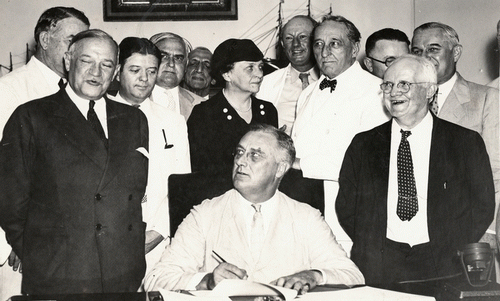Relax - I'm not the one coming for your Social Security check. No, I recognize that Social Security benefits are the biggest reason that poverty among our elders has declined over the past eighty years. It's a good program, and there is a balance of $2.7 trillion in the fund from which your benefits are paid.
But where did that money come from, and at what cost? In 1935, the Roosevelt administration needed to act. Given the political and economic environment of the time, getting the program funded at all was a remarkable achievement. But policymakers didn't foresee the damage that would be done by that little tiny payroll tax.
"How will we pay for it?" is the question opponents of any program ask. It's a political approach that has little to do with economics. And it's the wrong question. Every government expenditure is good, bad, or indifferent on its own merits. So is every source of revenue.
Government can raise money in just a few ways:
- Print it - increase the money supply by fiat
- Borrow it - pump up the deficit and add to the national debt
- Tax assets - seize a part of estates, gifts, real estate, and other property
- Tax income - take a cut of wages, salaries, dividends, gains, and gift receipts
- Tax consumption - grab a percentage of retail sales, imports, or value transfers
How we choose to raise money for government affects the economy. We print or borrow money as a last resort, when all other sources of revenue have fallen short. Taxing assets is a classical way to redistribute wealth, but those with wealth generally have the power to prevent it. Taxing income is a great way to fund government operations, because the money comes from its greatest beneficiaries - who happen also to be those most able to bear the costs.
That leaves only consumption as a viable source of government revenue.
We're familiar with consumption taxes. Sales taxes are applied to many of the goods, and even the services that consumers purchase. The fuel tax at the gas pump is another example, even though we don't see it directly. Other consumption taxes that are even less obvious to us include import tariffs and business fees.
Taxes on consumption raise prices. And economists say that higher prices make people buy less, and demand is reduced. That's not all bad, because a tax on something that's bad for society reduces consumption. Such "sin taxes" are usually applied to things that raise costs to society - things like cigarettes, alcohol, and fossil fuels. But it doesn't make any sense at all to apply a "sin tax" to things that benefit the economy. But that's exactly what we do!
Social Security and Medicare are funded with consumption taxes. Most people think payroll taxes are paid against income, but their impact on the economy tells a different story. Let's look at payroll taxes from two contrasting viewpoints - the worker and the employer.
Workers look at their pay stub and see withholding for Social Security and Medicare equal to 7.65% of their gross earnings. They never see this money. Instead, it's sent to a government fund along with an equal amount from the boss. After it arrives in the fund, it's eventually paid out as a benefits to a retired, disabled, or sick person. And what choice does the worker have? None at all. Nobody decides to accept or decline a job because of these taxes. Nobody decides how hard to work because of these taxes. And nobody decides how to spend money because of these taxes, because the money just isn't there to spend.
What about the employer? The cost of employing a worker is increased by 15.3%! There's 7.65% that must be "paid" to the worker plus 7.65% that is added to what that boss takes back from the worker and sends to the government. Payroll taxes raise the price of labor. Economists say that higher prices reduce demand. And employers have alternatives whenever they face hiring decisions.
Economists call this contrast the "tax incidence." When a tax affects the decisions you make, you've got a case of tax incidence. When a tax is of no consequence, it just doesn't affect your decisions at all. The tax incidence of the payroll taxes falls squarely on employers, not workers.
But it gets worse. Because the cost of labor also bears this "sin tax," its higher price generates some ugly consequences. Higher labor costs reduce labor demand. This directly causes unemployment as employers scramble to minimize their workforce and maximize its efficiency. What choices can they make?
- They can invest their money to make their operations more efficient so they can employ fewer people.
- They can raise their prices to make up for the extra cost.
- They can game the system by manipulating hours and benefits to offset higher labor costs.
- They can outsource their labor to Mexico or China.
- They can even move their entire operations offshore.
Employers have lots of choices to deal with high labor costs, and they are always bad for workers and often bad for the economy.
So Social Security is good for our elders, but the way we fund their benefits is insane! We raise unemployment rates. We slash labor's bargaining power. We raise the prices of our products. We gut the manufacturing base of our economy. And we chase our capital away to foreign countries. Crazy, isn't it?
Can it be fixed? Sure, but it's a big fix. Stop taxing the employment of labor and replace the lost revenue with revised taxes on income! This isn't a tax increase, but rather a change in the basis on which revenue is generated. Remarkably, such a progressive structure could max out at a marginal rate of only 40%. And it would generate much more robust economic growth, higher per capita income, lower unemployment, higher profits, and lower prices for goods and services produced in America. But it requires throwing out today's tax code and replacing the whole thing.
(Note: You can view every article as one long page if you sign up as an Advocate Member, or higher).





